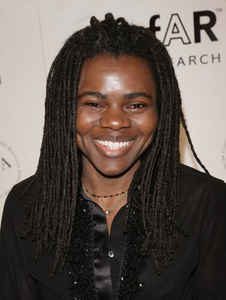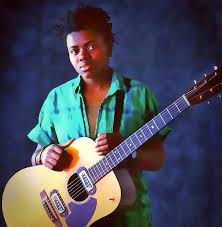Tracy Chapman - Folk Music
By Kyleigh Brown
Background
Tracy Chapman is an African-American, Grammy Award winning singer-songwriter who’s music focused on depicting some of the harsh realities that come with being black, a woman, and lower class. Sticking with the roots of folk music, she also used her music as a form of activism as many were a call to action against racism and sexism not only for African Americans but for black people across the diaspora.

Continuing Folk Musics Purpose (Resistance)
Historically, folk music was a way for black people to communicate with one another without being monitored by slave owners; they would sing to pass the time or to encourage each other while working. Among the many purposes folk music had, one of the main was to communicate a common struggle and (in some instances) as a call to action against the experiences and conditions they endured in life in hopes for a better way for all.
This was exactly the way Tracy Chapman used folk music to express the struggles that black people in poverty were going through in her time, and continue to go through today. For example, Chapman’s resistance to giving in to capitalist or materialistic values set by the American Dream in favor of uplifting the entire community out of poverty rather than the few. Chapman is not just denouncing the American Dream but the Western idea of capitalism in favor of uplifting black people across the diaspora.
Talkin' Bout A Revolution vs. Fight the Power
In history when it comes to conflicts in civil rights there is usually a Martin and a Malcolm; two people who are fighting for the same cause but using different methods that conflict with one another. Tracy Chapman tells a reality that many people of the black community can understand. Chapman talks about the limitations of a poor, black women, something many people can relate to even if they are not a part of all of the disadvantaged groups. Rather than creating an image of wealth and power in an attempt to show our “progress” through material and capitalistic values as we sometimes tend to do in media/music to cast off the image/stereotype of poverty surrounding black people, Chapman encourages change in a way that will benefit the many rather than the few.
However, rap embraces these ideals in favor of showing that there are people in the black community who have materialistic things and showing that it is achievable. Both of these entities branched off from folk music, being as rap came from the clever vernacular slaves used to communicate with one another, and has the same purpose of protest and is used as a call to action. Neither one is more right than the other, however they do directly conflict with each others ideals. Along with this, Public Enemy’s rapper Chuck D stated that “Black people cannot feel Tracy Chapman” despite the intended audience being mainly black people and being about the experiences many black people go through in America. Though the main crowd of listeners were white, that should not dismiss the intention and value of the song.
Works Cited
Jenkins, Rasheedah Quiett, “The songs of black (women) folk: music, politics, and everyday living” (2008). LSU Doctoral Dissertations. 4048.
https://digitalcommons.lsu.edu/gradschool_dissertations/4048


